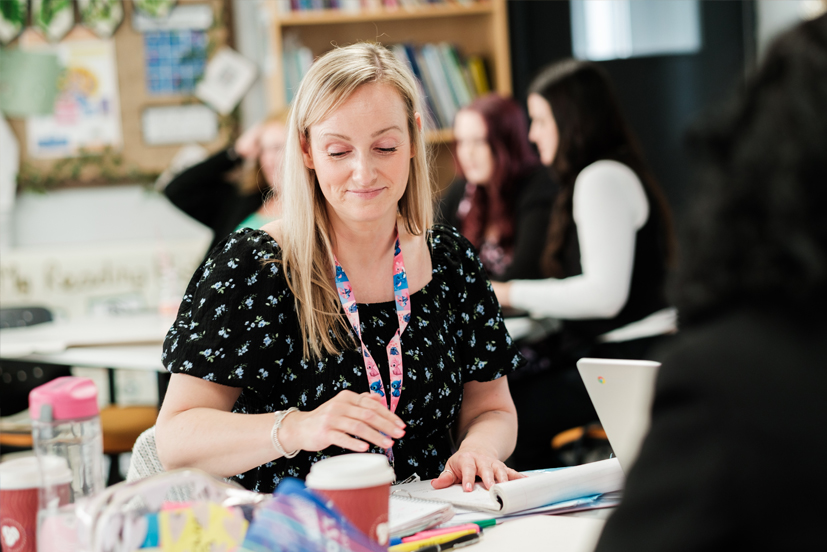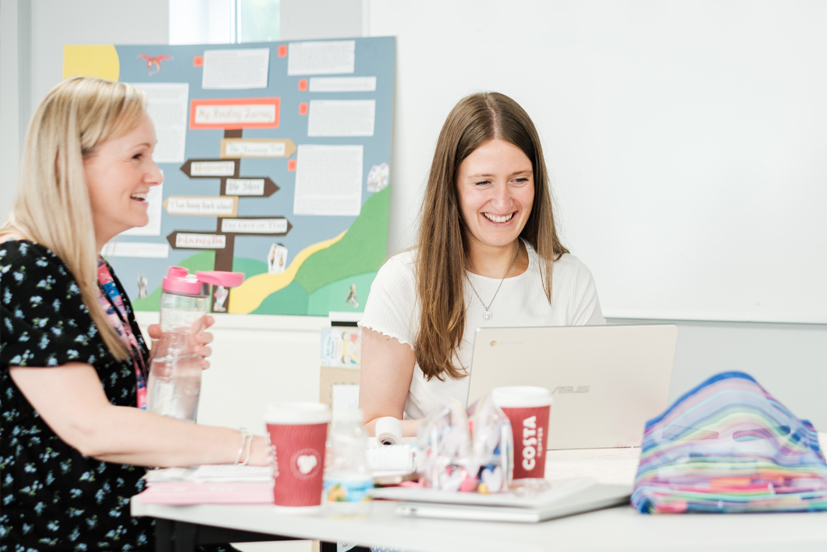
Course details
UCAS Code
FYEC
Year of entry
2026
Duration
4 YRS (FT)
Institution Code
G53
Location
Wrexham
Why choose this course?
Unlock your potential and be part of a workforce which can truly shape the lives of young children and families. This dynamic and forward-thinking programme is your gateway to a rewarding career dedicated to the holistic development of children from birth to eight years.
You will:
- Benefit from our series of guest lectures
- Undertake placements across all levels, allowing you to spend time in real-world settings, including schools, nurseries, and community organisations, to apply their learning and gain valuable experience
- Have the opportunity to engage in out-of-class events, such as student/staff quizzes and lunches
- Attend field trips in a variety of environments from Xplore to outdoor learning sessions
- Engage in collaborative projects with classmates on creative initiatives
- Be provided with a route into mainstream teaching via a PGCE (Primary Education) or PCET (Adult and Further Education) teaching qualifications
*This course is part of a subject area ranked top 5 in the UK for Student Satisfaction in the Education subject area league table in the Complete University Guide 2026.
*This course is part of a subject area ranked 1st in Wales and Top 5 in the UK for Satisfied with Teaching in the Education subject area league table in the Guardian University Guide 2026.
This course is part of a subject area ranked Joint 2nd in the UK for Satisfied with Feedback in the Education subject area league table in the Guardian University Guide 2026.
Did you know?
By studying an Early Childhood Studies degree at Wrexham University, you'll gain access to unique benefits designed to help you succeed.
Key course features
- Join a Foundation Year focused on personal, study and career development
- Explore the link between study and practice and start to develop transferable skills key to gaining successful employment
- Explore a range of contemporary topics relevant to working with children from birth to eight years. Drawing on the domains of psychology, sociology, human rights, education, and health and well-being, acquire skills to help you gain employment in the early years sector
- Gain practical experience through diverse placements in schools, nurseries, local authorities, third sector organisations, and the private sector. Contextualise your learning and build valuable employment relationships.
- Benefit from additional training and qualifications such as Outdoor Learning, Makaton and Paediatric First Aid to enhance your employment potential
- Make a unique contribution to the field of early years sector through authentic work-based research on a topic of your choice
- Experience an inclusive and flexible learning environment, supported by a friendly and experienced staff team committed to your growth and success
What you will study
YEAR 1 (FOUNDATION YEAR)
The Foundation Year is an integrated year where you will study core modules with a broad range of students from across the Faculty of Social and Life Sciences, giving you access to different perspectives and networking opportunities.
The modules will equip you with key skills needed for Higher Education and beyond. They will give you the chance to explore your subject area and available careers, allowing you to adapt your reading and assessments to be relevant to your degree pathway.
Alongside teaching from the broader faculty staff, you will be able to meet with staff and other students from your main degree pathway and get involved with events and opportunities that they are running.
- Study Skills for Success (Core): This module will provide a solid foundation in academic conventions and time management skills to help you to progress through your degree.
- Resilience in Higher Education and Beyond (Core): Personal development and resilience are as important as academic skills in the accomplishment on your journey towards graduation, and this exciting module will equip you with the attributes needed for this.
- A Day in the Life (Core): This module allows you to explore the potential career options open to you on completion of your chosen degree. You will be exploring the professions linked to your degree and start preparing your graduate portfolio for employers.
- Life and Work in the Welsh Context (Core): This module will give you the opportunity to explore your subject area and/or desired career in relation to living and working in today’s Wales.
- Welsh for First Time Learners (Optional): This module provides an introduction to the Welsh language for those taking their first steps.
- Numeracy (option): If your degree requires a competent level of numeracy, you may be advised to choose this option.
- Professional Communication in the Workplace (Optional): In this module, you will begin to develop the skills and aptitude necessary to communicate effectively in a professional context.
- Maths and Experimental Design (Optional): If your degree pathway requires an understanding of numeracy and sciences, then this module is designed to provide the opportunity to achieve that.
YEAR 2 (LEVEL 4)
Level 4 offers you the opportunity to build strong foundations in the field of education studies. You will learn how to be a degree level student and prepare for and undertake your first 6 week placement.
MODULES
- Play and Outdoor Learning: This module will introduce you to the importance of play in children’s lives, learning and development. You will explore the value of moving learning outdoors and how this is represented in the early years curriculum. You will make the link between play and being outdoors and examine how practitioners can support the holistic needs of young children.
- Contemporary Debates in Childhood and Education: In this module, you will explore the different and varied influences that society and the environment has on childhood and education. Topics could include mental health, technology, sustainability, race, gender and poverty.
- Psychology of Childhood: In this module you will develop a psychological understanding of child development and consider how adults can influence the way children think, feel, and interact with the world around them.
- Professional Practice for Childhood and Education: This module will prepare you for placement by exploring the expectations, conduct and attitudes required in the workplace. You will cover health and safety, safeguarding and the ethics of working with children. You will also start to consider your own future career goals. During this module you will experience a 6 week placement in practice.
- Skills for Study and Employability: This module is all about building study and employability skills. You will be guided to explore your current skills and to develop these further to enhance your learning journey and future career outcomes. This module will also help you to develop digital technology skills to use in your studies and in employment.
YEAR 3 (LEVEL 5)
Level 5 builds on the skills and knowledge you developed at level 4 by further specialising in the field of education. At level 5 you are introduced to authentic work-based research and you will engage with your extended 8 week placement.
MODULES
- Speech and Language Development in Early Childhood: In this module, you will explore the theories of language acquisition and how this applies to language development in young children. You will consider the importance of meaningful interaction and the role of the practitioner in supporting children with a range of speech and language needs.
- Social Action – Supporting Children and Families in Society: In this module, you will explore informal education and the role that society can play in supporting children and families within their communities. You will discover what it means to be a volunteer and the benefits you may gain from this. You will be introduced to a range of voluntary organisations including the Children’s University and HomeStart (amongst others) and encouraged to explore their purpose and the activities/services they provide.
- Children’s Rights and the Law: This module will support you to understand the legal framework underpinning children’s rights and the complexities of supporting children’s rights in practice. You will consider how children’s rights are expressed within law and policy, the critical debates around the UNCRC and the variety of ways children’s rights can be supported by those responsible for the care and education of children in society.
- Practice Informed Research: In this module, you will explore the meaning and purpose of practice informed research before choosing an authentic topic to research on placement. This is the start of your research journey and by the end of your 8 week placement you will have obtained ethical approval and collected your research data using primary research tools ready to write your dissertation at level 6.
YEAR 4 (LEVEL 6)
At level 6, the aim is to successfully complete your degree and apply your knowledge to practice. You will explore the role of leadership in practice and plan your own professional development whilst out on a three-week placement. You will also further develop your independent study skills by completing your final year dissertation.
MODULES
- Critical Perspectives of Health and Wellbeing: In this module, you will develop a critical understanding of health and wellbeing and its relevance to young children and families. You will analyse the key national policies and initiatives used to promote health and well-being and the pivotal role that professionals working with young children can play.
- Exploring Expressive Arts: This module will help you to understand the role of the expressive arts in education and childhood. You will explore a range of expressive arts analysing their connection to cultural and historic contexts and their role in promoting social justice and equality for all children. There will be opportunities for hands on practical learning.
- Leadership and Professional Development: In this module, you will explore the role of leadership in practice and shadow a practitioner with leadership responsibility in your level 6 placement. You will also start to consider your own professional development as you prepare to enter employment or further study.
- Dissertation: This module supports you to engage in an extended piece of academic writing. Based on the primary research data you gathered at level 5 you will write a research dissertation which foregrounds your own unique voice as a researcher.
The information listed in this section is an overview of the academic content of the programme that will take the form of either core or option modules. Modules are designated as core or option in accordance with professional body requirements and internal academic framework review, so may be subject to change.
Entry requirements & applying
The academic requirements for the course are;
- 48-72 UCAS tariff points at GCE A Level or equivalent.
- GCSE grade C/4 or above in English/Welsh (First Language).
For students without the standard entry qualifications, it may be possible to take this course if you have additional life or work experience and can demonstrate an ability to engage with the academic challenges of the programme. Candidates without standard entry requirements may be invited to interview.
All full-time applicants successful in being offered a place on the programmes will be subject to a satisfactory DBS clearance undertaken by Wrexham University.
Teaching & Assessment
As a full-time student you will attend campus for up to 3 days per week which will include a mixture of classroom and online based learning. Classroom sessions provide you with an opportunity to learn alongside your fellow students and are based in activity and discussion. Online materials are used to prepare you for the classroom sessions and to provide follow-on work/research for you to complete in your own time.
A range of assessment methods will be used throughout your Foundation Year to allow you to practice the academic skills required of a degree level student.
On successfully completing your Foundation Year, placements will start in the first year (level 4) of your main degree programme.
Placement in practice forms an important part of your degree studies. During your studies you will undertake 3 placements:
Level 4 - Professional Practice for Childhood and Education (40 credits). You will attend placement for 2 days per week for 6 weeks (84 hrs). At level 4 the purpose of the placement is for you to explore and experience professional competencies in practice.
Level 5 - Practice Informed Research (60 credits). You will attend placement 3 days a week for 8 weeks (168 hrs). At level 5 the purpose of the placement is for you to engage with authentic research ideas and to collect primary research data.
Level 6 - Leadership and Professional Development (40 credits). You will attend placement 3 days a week for 3 weeks (63 hrs). At level 6 the purpose of the placement is for you to observe leadership skills and to consider your own professional development in relation to future employment.
Our placements include (but are not limited to) schools; nursery settings; local authority settings, for example the Child Prevention and Support Service and Flying Start; third sector organisations, for example Home Start, Action for Children and Save the Family; and the private sector, for example Residential Homeless Support for Families and Residential Family Assessment Centres.
Career prospects
Our dedicated Careers and Employability team is committed to helping you achieve your professional goals. They provide personalised advice, useful resources, and extracurricular employability events to prepare you for the job market.
You may choose to further your expertise through postgraduate studies. Explore our postgraduate courses for more information.
Fees & funding
You do not have to pay your tuition fees upfront.
The fees you pay and the support available will depend on a number of different factors. Full information can be found on our fees & finance pages. You will also find information about what your fees include in the fee FAQs.
All fees are subject to any changes in government policy, view our undergraduate fees.
Accommodation
At Wrexham University, we offer on-campus en-suite rooms within our Wrexham Student Village. These private, fully furnished spaces are conveniently located, providing easy access to campus facilities, study areas, and social spaces. Plus, you’re just a 10-minute walk from the city centre!
With all bills included, free Wi-Fi, 24/7 security, and large social areas, you’ll find everything you need for a great student experience.
Explore our student accommodation options to find your perfect home away from home.
Upcoming Open Days.
Join us at an upcoming open day to meet your lecturers, find out more about our courses, discover our facilities and get a taste of student life.
Browse all of our open days & events.

